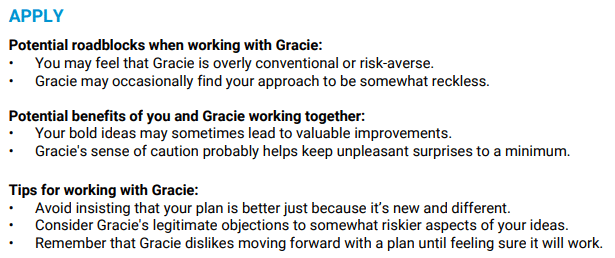DiSC for Couples

Do opposite personalities attract? Do couples with similar personalities have fewer conflicts? The answers, like most aspects of interpersonal relationships, are complicated. More than personality compatibility, success in relationships often relies on self-awareness, respect, and honest communication.
Key Takeaways
- There's no simple rule about DiSC® styles and compatibility. Same-style relationships are easier in some ways and harder in others. The same is true for different-style relationships.
- DiSC tools like comparison reports give couples a non-judgmental way to discuss their priorities, motivations, and stressors.
- An awareness of DiSC styles can be especially useful when supporting your partner during stressful events.
Sometimes very different personalities in relationships complement each other in useful ways. Sometimes they clash. People with similar personalities can find deep understanding or can get stuck in unhealthy feedback loops.
For example, two people with DiSC S styles might not have a lot of what outsiders would label as conflict in their relationship. That's likely because S-style people value harmony and stability, so seek to avoid conflict when possible. This hypothetical couple likely does a lot to support one another.
However, they might be letting resentment simmer. They also may be putting off big decisions, or missing opportunities because they are too risk-averse. People who share personality strengths may also share blind spots. This couple will need to be proactive about challenging each other and moving more quickly at times.
Even couples who share a DiSC style must learn how their preferences differ. If we let our unconscious run the show, many of us judge each other based on our own preferences. Maybe we expect our spouse to share our preferences for sociability, our way of behaving in the world, and even our fears. Then we become hurt or confused when we discover that our loved one’s desires and behaviors differ from our own.
DiSC profiles can help couples better understand each other’s differences. This understanding can help us see that our partner’s priorities aren’t necessarily misplaced just because we don’t share them.
Using DiSC to navigate personality differences in couples
In our Facebook group, we asked about people’s experiences using DiSC with their significant others. Here are some responses:
- “He’s a strong D and I’m a strong S. I’ve learned not to waffle and just get to the point.”
- “As iD-styles, we can both be impulsive and direct, and now we catch when the other is doing it and can help hold each other accountable.”
- “She’s a C style and I’m an SC, so we can get really bogged down trying to make decisions. Do you realize how many decisions you have to make every day? It helps when we take a second to identify which decisions are a big deal—new jobs, large purchases, choices that affect our extended family—and thus merit the research and deliberation we’re putting into them. The rest—which restaurant to try, what movie to watch, etc.—don’t matter much in the big picture, and we have to remind ourselves of that.”
Differences are normal and can enhance a relationship. Couples can discover more about themselves and about their partners after completing a DiSC assessment. The profiles provide nonjudgmental language they can adopt to describe themselves and their partner. Each person’s normal personality traits are shown in a positive light.
DiSC doesn’t hide away the challenges of different personalities; however, it does help put them in context. For example, one person’s natural inclination toward skepticism might play out with a partner’s statements being frequently challenged. This could easily be misinterpreted as attacking and dismissive. It could trigger a partner’s fears of disapproval. Together the couple can consider how these challenges might come from a need to analyze and understand, not to criticize. And the challenger can work with their partner to find ways to express more enthusiasm for the partner’s ideas before asking questions about them.
Marriages are enriched as couples further appreciate the complementary qualities of the other spouse. Understanding personality styles opens the door for greater levels of communication, encouragement, honor, acceptance, and intimacy.

Comparison Reports for couples

Sample continua scale from the DiSC Comparison Report
A very helpful tool for both couples and relationship counselors is the Comparison Report. It is available once two people have taken the profile (see Everything DiSC® Comparison Reports). It provides graphs like the one above. These are good places to begin a conversation. How are you currently experiencing this difference? How is it valuable in your relationship? What could reduce any conflict that arises from this difference?

Tips from a sample DiSC Profile Comparison Report
Tips are also offered in this report. Couples can discuss if they think these tips might work for them or if they have even better ideas.
We should interject here that DiSC profiles cannot predict the likely success or failure of a marriage, determine the roles each partner should have within the marriage, or point out how to change or alter anyone’s behavior. But it can help you better understand your partner, appreciate your partner’s differences and contributions, recognize possible reasons for conflict, enable better communication, and affirm the normality of a range of behaviors.
DiSC helps couples reflect on questions such as:
- How does each of us prefer to communicate? What does each of us need from the other in order to feel heard?
- How does our preferred pace affect our relationship?
- What makes each of us stressed? How does each of us deal with stress?
- How do our differing or similar priorities influence our relationship?
- What strengths does each of us bring to our relationship?
I recommend using the Everything DiSC Workplace® profile with the Comparison Report. Even though the assessment was created for business use, it applies to marriage. The profile’s focus on personality, what one finds stressful or motivating, and how to better connect with others is as helpful to relationships at home as it is to work relationships. View a sample Workplace profile and a Comparison Report to judge for yourself.
Another useful profile is Everything DiSC® Productive Conflict, which helps learners understand how to manage their responses to conflict situations. It also explores the destructive and productive conflict behaviors typical of each DiSC style. It can help those having difficulties with responding to conflicts.
DiSC for couples during stressful times
During less stressful times, we often flex in and out of various styles during the course of a day, adjusting our personalities in small ways to meet the moment. During stress, however, people may stick more rigidly to their deepest-running personality traits.
A disaster event can temporarily bring couples closer, but ongoing stress such as long-term caregiving can put a lot of strain on intimate relationships. We’re writing this with partners and spouses in mind, but much of the advice can be useful in other relationships as well, such as siblings, roommates, and close friends.
DiSC can give you individualized, actionable tips for getting through periods of stress with your partner. It can bring focus and direction to your conversations, rather than finding yourselves having the same argument you’ve had a hundred times already, or orbiting each other in silent stand-off.

DiSC styles during disruptions and stress
It’s possible for something to cause your partner stress when it’s only an inconvenience for you, or vice versa. If any of the points below resonate with you or sound like your partner, use this article as a starting point for discussion: “This is one way I’m struggling right now,” or “Are you experiencing this? Let’s talk about what might help.”
D style
A few things that may be particularly difficult for D styles during times of stress or crisis:
- They are not in control. During a crisis, they are constantly confronted with how much is beyond their control, from the actions of politicians to the choices their neighbors make.
- They can’t take action. D styles want to go go go, but during something like an injury or illness, what may be necessary is actually inaction or rest. They want to lead, but that might not be what their body or other people need from them right now.
- They feel vulnerable (and they hate feeling vulnerable). D styles become frustrated when sidelined by restrictions, limitations, unforeseen disasters, or illness, and may lash out at loved ones.
- People are emotional. D styles struggle when they feel others are being too emotional or “needy.” They may become impatient with partners who need to be more expressive of their feelings.
To help your D-style partner: Be direct, but when you are challenging them, make sure they know you are not challenging their authority, but rather helping them see the bigger picture.
i style
How i-style people may struggle during a crisis:
- Their social life changes. Much of i-style folks’ energy comes from being around other people, and there are times when that is not possible, such as when they are involved in intensive caretaking or when people are isolated due to a pandemic or natural disaster.
- Their days are too repetitive. A time of stress may result in a string of days where you’re asked to do the same thing over and over. This can be true with a new baby or when taking care of someone who is ill. It’s true during lockdowns or severe weather events when going out is less of an option. This rut may be particularly stressful for i styles, who crave momentum and novelty.
- They are distracted. Stress makes it harder for most people to concentrate, but i styles may be extra prone to distraction and struggle to complete tasks, whether those tasks are for work or home.
- Not everyone wants their positivity and ideas. One of the great strengths of people with i styles is their natural positive nature. Sharing this upbeat energy is a wonderful gift to many people during times of crisis, but others may not react well to it, and that can hurt an i-style person’s feelings.
To help your i-style partner: Listen to them—real deep, active listening. Find creative, short-term projects you two can collaborate on. Encourage friends to connect with them. Think of fun ways they can express themselves.
S style
What stresses out S-style people during times of upheaval? It could be:
- Nothing feels stable. During times of upheaval, so much becomes precarious and uncertain: massive layoffs, school cancellations, ill family members, a carefully planned year suddenly unmoored. Stability is important to S styles, and they get little of it during crisis.
- They’re taken advantage of, or they overcommit. S styles can struggle with saying no, so they often find themselves with extra work dropped on them. During stressful times, they may be overburdened both from the office and with an unbalanced amount of household chores (plus all those volunteer tasks they took on…).
- It’s harder to escape conflict. Conflict makes S-style people uncomfortable, and they will often just go along with something or remove themselves from the situation rather than argue their side. During a crisis, it might be harder to escape. Navigating their marriage or partnership through times of stress without making their voice heard doesn’t feel good either, but it may be the path they choose.
- They don’t know how to ask for help. S styles worry about inconveniencing others or being a burden. Even if S-style people are really struggling, they are probably keeping it to themselves. Even so, they can build up resentment toward their partners for not noticing the difficulties they are going through.
To help your S-style partner: Encourage them to speak up. Remember that their silence may not mean agreement. Assure them that conflict can be productive and healthy. Show your love by doing more housework, especially if your partner has extra work from the office or new caregiving duties.
C style
People with C styles may struggle during times of crisis for these reasons:
- There’s so much ambiguity. C styles like clear goals, data they can assess, and situations that follow logically from one step to the next. With a pandemic, natural disaster, political upheaval, strained relationship, or complicated illness, there’s so much “wait and see.”
- It’s harder to ask for help. C styles struggle with asking for help anyway, worried that it makes them look less competent. When they are isolated from their usual social and professional networks, or everyone around them is also under extra stress, reaching out will feel like even more of an effort.
- They don’t see their experience reflected as often. Some of the more outgoing styles tend to share their experiences more and be more vocal in person and on social media. This means more reserved people like C styles might feel alone in how they’re reacting to a crisis or disconnected from the predominant social narrative.
- There’s often no clear way to be “good at” a crisis. C styles get a lot of satisfaction from excelling, being competent, and gaining expertise. What this means during something like a pandemic or political upheaval can be unclear. If C styles divert their energy into pushing new projects at work or at home, they may feel frustrated at coworkers or family members who are more emotional and less able to focus.
How to help your C-style partner: C styles may need your help but have a hard time asking you for it. Ask if they need help, but try to do it in a way that respects their competence. Focus on the facts—what is known about your situation—and problem-solve together.
A final reminder: DiSC is not a substitute for couples counseling, nor is it a predictor of compatibility. In fact, what DiSC teaches us is that everyone is capable of working well with people of every style.

Posted 04/03/2011, Last Updated 01/27/2025







